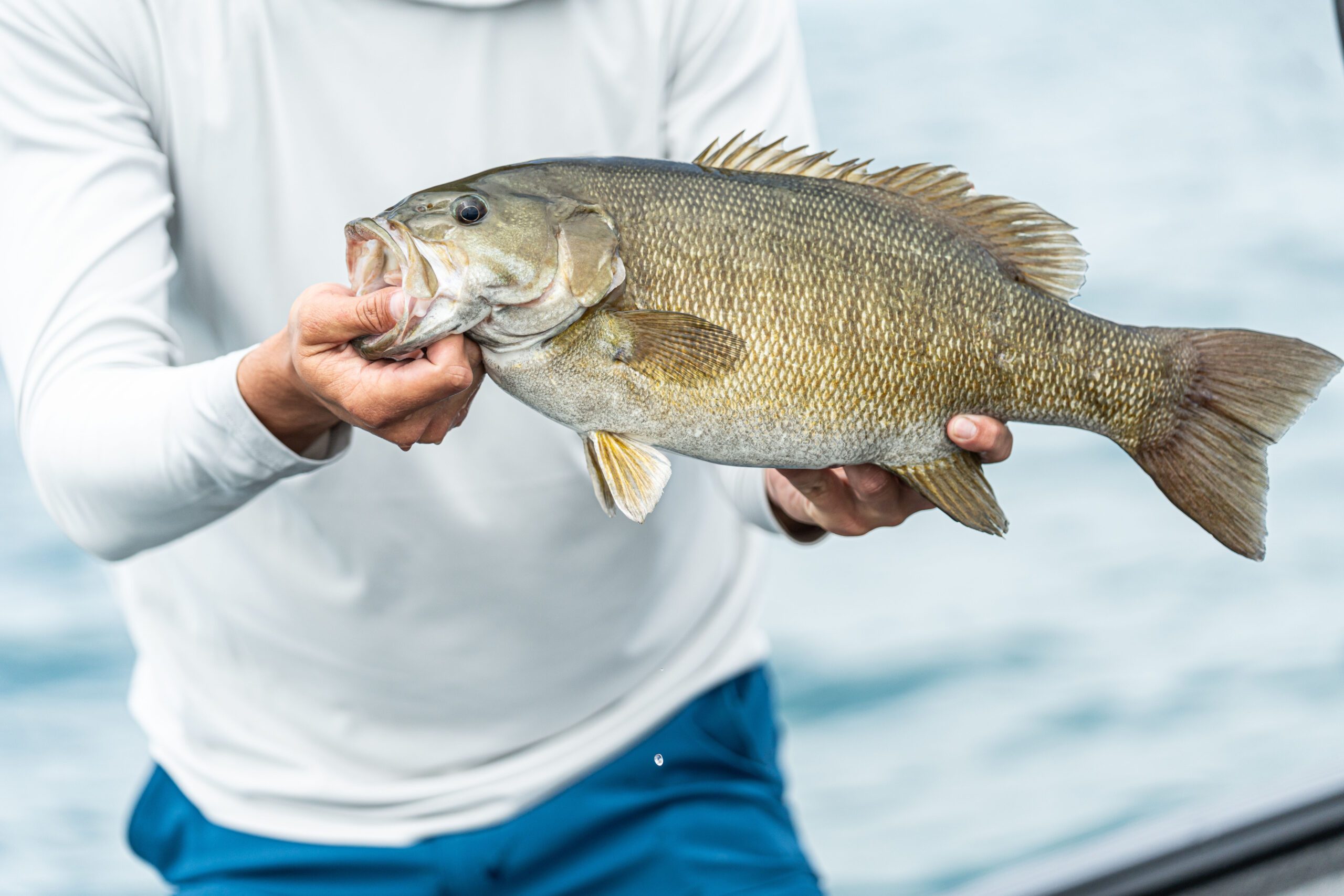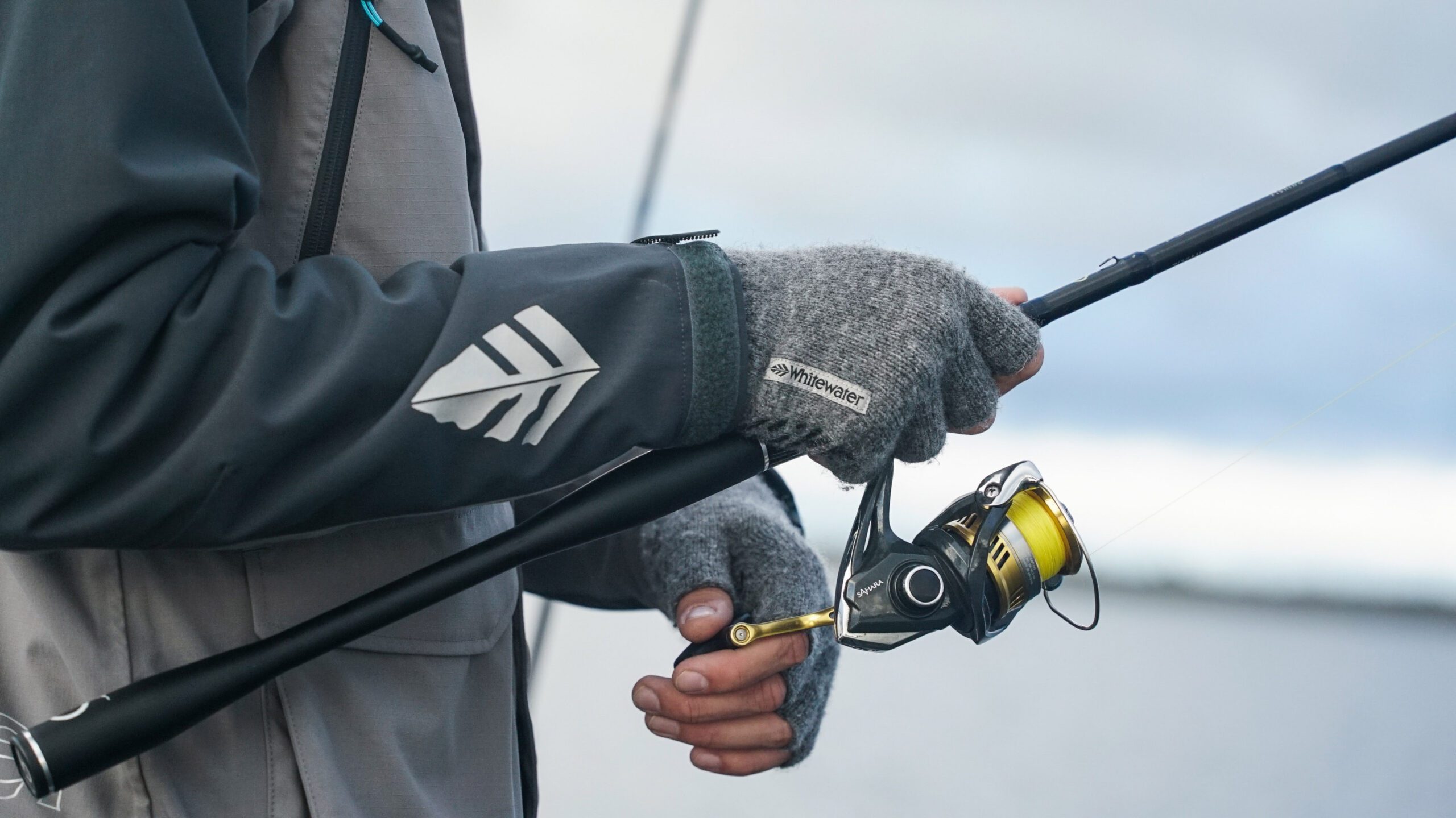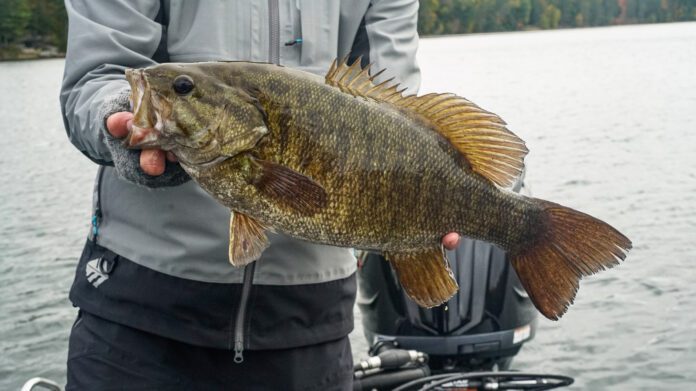
| Eleventh Hour Bronzebacks |
| Tackle selection for river-ranging smallmouth bass as autumn progresses toward winter. |
| By Jay Anglin |
| MUSKEGON, Mich. (October 1, 2024) – Pound for pound, smallmouth bass are undeniably one of the hardest fighting freshwater fish in North America. Words like ‘belligerent’ and ‘chippy’ come to mind when describing their demeanor when hooked, hence their popularity with anglers.While in many regions of the country smallies maintain their position as a top attraction throughout the summer months, an unfortunate number of anglers lose interest once other fall attractions kick in. Besides hunting seasons, muskie, walleye, salmon, steelhead and even stripers, redfish and tuna steal a lot of the thunder after Labor Day.However, some of the best smallmouth fishing of the year takes place as water temps begin to slink, triggering a heavy feeding period that may only last a few weeks. This is when a lot of trophy sized fish shed their hard-earned reputation for being difficult to catch. |

| While big smallmouth can be caught in countless lakes during fall using a variety of techniques, they’re also perfectly content to spend their entire life in flowing waters as massive as the Mississippi and St. Lawrence rivers, to small creeks, and everything in between. Boat handling and setup are key elements for successfully targeting river smallmouth and understanding how river fish relate to currents is also very important. River smallies have an exceptionally diverse choice of forage to feed on, and that’s one reason fishing for them this time of year is so intriguing from an angling perspective. River smallies will move up and down river systems, but as cooler weather progresses, schools gather in deeper holes associated with cover such as downed trees, but it’s not unusual for larger individuals to go rogue and defy the rules by stretching summer feeding patterns well into fall. Smallmouth bass are naturally curious, and their generalized feeding behavior lends well to starting with some basic techniques and presentations. |

| The DAIWA HMKL Minnow is an awesome jerkbait for fall bass. |
| Surefire Conventional and Fly Options for Fall SmalliesThe Baitfish BlitzLike many species, smallmouth gorge on big baitfish during late summer and fall. While active river smallies will hold near cover and ambush prey, this time of year you will also find them cruising flats or deeper stretches of river searching for schools of baitfish, and it’s not uncommon for them to blitz bait on the surface. This usually occurs midday when water temps warm slightly. You even see some skinny water activity as aggressive fish push bait into the shallows. Aggressive smallmouth will hammer minnow imitations fished at medium speed with abandon. Jerkbaits, swimbaits, spinnerbaits, or streamer flies are all great options, while inline spinners are extremely undervalued in this situation and a great problem solver. Depending on water temp and mood, the value of fishing jerkbaits or streamers over the other options is the capability to adjust presentations from the classic jerk and strip/pause style retrieve, to more of a finesse style, including long pauses that mimic a wounded or lethargic baitfish. This is not a case of curiosity and takes are often spectacular kill shots. |

| The Ever Green WH-8 is a lights-out crayfish imitator. |
| Old Reliable CrayfishSmallmouth bass are crayfish junkies and will rarely pass up the chance to eat a fleeing one (crankbait, crayfish streamer) or a slow moving one off the bottom (tube jig, etc.) When in crayfish mode, fish will scour the bottom especially where medium to large rocks and boulders are found. In streams with limited rocky substrate, smallies will often stay up in the water column searching vertical hard structures such as seawalls, rip rap, and natural cliffs that extend into the water – pretty much anything hard that will hold crayfish. A crack in a sagging seawall, for example, is very likely to hold crayfish and will regularly draw the attention of foraging smallmouth bass. Unlike smallmouth cruising a flat for food, these fish may be hyper focused as they search “the wall”, and it is common for them to orient perpendicular to the current by finding small protrusions that afford some relief from current. Don’t just randomly cast toward these spots, though, because your lure or fly may not fall or drift where the fish is focused. Consequently, these fish may ignore your offering or miss seeing it entirely. It’s extremely important to make meaningful, accurate casts as close to the structure as possible to increase the odds of being seen. Passive, inactive fish typically can be found loafing in softer pools near cover – especially overhead, or near the bottom in deeper water, much the way trout often do when avoiding predators. This is a great spot for a finesse presentation with a tube jig or similar lure. Drop it in and let it descend while being vigilant for line movement or hard stops that occur before your lure hits the bottom. Snipers are quick, so you must be attentive. |

| Ever Green’s SB-125 is big profile topwater perfect for big autumn smallmouth. |
| The Surface Bite…WHAT!Smallmouth often behave like big trout, including their feeding behavior. River smallies are very prone to “look up” and lock into surface activity just like a trout feeding on mayflies. Insects, frogs, and minnows skimming the surface are still in play, especially during stretches of warm, dry weather.Smallmouth bass are generalists and curious by nature, regularly taking advantage of their diverse feeding strategies. Any given day a smallmouth may gaze at the surface and go for a conventional/fly popper, frog imitation, twitched stickbait, and the like. These are hot options during summer months, so why not try them in the fall? Fish them slowly, only popping or twitching every 5 seconds or so – the key is patience. Some of the best eats of the year are when a big burly smallmouth rises slowly from the depths and zaps a motionless popper off the surface. |

| Finer PointsAutumn is a great time to use stout fluorocarbon that disappears in clear water and high sun. Consider leaning on 10- and 12-pound tests. Braids with fluoro leaders also works fine. The truth is it’s really a matter of personal preference. Conventional gear is also a matter of preference but lean heavier on the actions this time of year as these fish fight hard. A little extra length never hurts, either – a fast 6- to 7-foot medium to medium-heavy action spinning rod is very versatile. Fly anglers should use a faster action, 7- or 8-weight with 10- or 12-pound fluorocarbon tippet. Leader length varies for each scenario, but it’s a lot easier to pick up, cast and control bulky streamers with shorter leaders and a clear tip intermediate fly line. Of course, poppers etc. require a floating line and ideally, longer leaders. |

| Whitewater’s Wool Fingerless Glove affords warmth and comfort on cold autumn days. |
| Location, Location, LocationIt’s unlikely you’ll find fall smallmouth in rapid stretches of river, at least in good numbers. Focus on large pools with a mix of cover such as logs/stumps and boulders either off the main river flow or in slower stretches of river. Depending on the water level, this can eliminate a heckuva lot of water, which makes finding fish easier. Structures such as wingdams, bridge abutments, deadfall sweepers, and random boulder piles are big magnets for smallies, as well as other predatory species.During autumn’s bluebird days, your best plan might be “tripping over your rods” on the way to the gun locker. |

| Wool Fingerless Glove FEATURES: Performance fit Durable Naturally antimicrobial for odor prevention Naturally regulates body temperature Silicone print on palm for grip Hand: 50% Lambswool/49% Nylon/1% Spandex Cuff: 49% Lambswool/48% Nylon/3% Rubber MSRP $29.99 |

| Knit Logo Beanie FEATURES: Premium knit construction Snug and comfortable fit Extends over the head and ears Maintains its shape Embroidered Whitewater logo One size fits most MSRP $19.99 |

